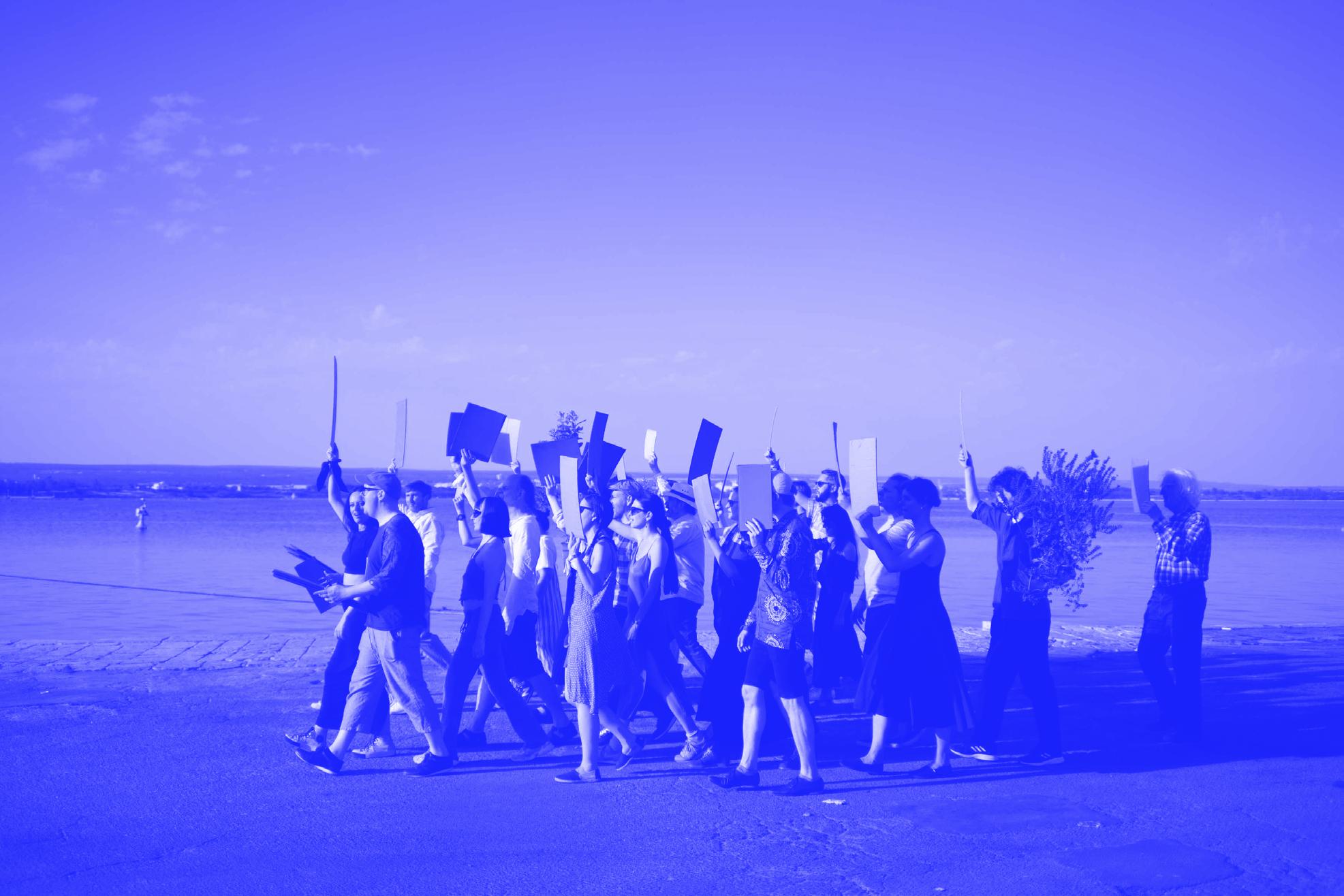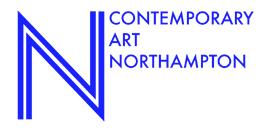NN Contemporary Art and Musarc present:






NN Contemporary Art and Musarc present:





‘To those who attempt to implement the methods described in this booklet, may it come to them easily and pleasurably.’
*
Cevdet Erek, How to Imitate the Sound of the Shore Using Two Hands and a Carpet (2017)
Northampton Complaints Choir (Open Song) is a temporary choral collective that emerges from a series of workshops and social events over the space of three weekends in April—July 2023.
The project is part of Sensing Place, an initiative by NN Contemporary Art that asks: what does it take to create more just and equal environments? How can we collaboratively inhabit places and foster a sense of belonging in our communities? How do we make a town, and how does it make us?
To explore these questions, we are bringing people together to make a choir that sings and moves and makes a manifesto, or songbook for Northampton — to explore any other questions the choir may have, make and sing the songs it wants to sing, be curious, and loud, and open-minded about the answers we discover.
The choir, which will be led and brought to life with the help of experimental choral collective Musarc, is free to join and open to everyone. It offers an opportunity to meet new people, cook and eat together, explore the town and make a wish for it, write poetry, sing and take part in collective music making and performance.
The Northampton Complaints Choir (Open Song) is a temporary, ‘pop-up’ choral society that emerges from a series of workshops and social events over the space of three weekends in April and July 2023 in Northampton: 22–23 April, 20–21 May and 1–2 July. The project is commissioned as part of Sensing Place, an initiative by NN Contemporary Art that asks: what does it take to create more just and equal environments? How we can collaboratively inhabit places and foster a sense of belonging in our communities?
Why a choir? In a choir, different voices make one voicebody. A choir creates a space for different voices to sound together, with and through each other, in unison or contrary motion. A choir can chant, it can sound like one. It can sound like many at the same time. It can lament, protest, or hum and conjure harmonies. It can hold joy and rage. But it always speaks as one body. A choir is a social voice, a coming together. That makes it powerful, and beautiful, and dangerous, and hard to get hold of, and mesmerising.
 Image: Musarc carrying colours and planting trees in Taranto, Italy, May 2022. From Sara Rodrigues’s Invocations. Photo: Aga Beaupré.
Image: Musarc carrying colours and planting trees in Taranto, Italy, May 2022. From Sara Rodrigues’s Invocations. Photo: Aga Beaupré.
This choir is open to anyone to join, and join in any way they want. You can sing, or move or speak. You can bring an instrument if you like. You can actively take part and shape the project. Or you can be a spectator, listener, and thinker. You can come alone, or with people from another choir you sing in. Or a whole brass band. Or people in your community project, or friends and colleagues from where you work, or your family. The choir may be large or it may be small. People will make the choir, and say what sort of choir it is. Or an orchestra?
This choir complains! To complain means to decry, to weep together. To complain is to say how we think things should be and to say what we hope for. In the context of art, there is a tradition of choirs that complain. The first Complaints Choir was formed in Birmingham in 2005 by two artists, Tellervo Kalleinen and Oliver Kochta-Kalleinen. More Complaints Choirs followed in Helsinki, Hamburg and St Petersburg in 2006. Since then, there have been Complaints Choirs in numerous different countries and cities. The term is a literal translation from the Finnish ‘valituskuoro’. But the idea of using a chorus to produce political, social or cultural commentary is ancient. It sits somewhere between the chorus in Greek tragedy or Noh theatre, protest songs and chants, and the singular voice of a football crowd.
What will we be making? We are making an Open Song about how people make places and find a sense of belonging. We start by thinking about how we make a town, and how we want a town to be – Northampton, or any town. But we keep an open mind about what the song wants to be. Whether we will sing it in the streets, write it down, perform it on a stage, or make it into a film. Whether it is short or long, a mini opera, a manifesto or a civic contract. Maybe starting the choir is the project, and the choir will go on. Maybe we make a new choral method for thinking through social with our voices and bodies. We are not coming with preformed ideas, but with a toolbox of singing and movement exercises, and techniques to make and move around ideas as a collective, a framework and a structure to bring the choir into being. We begin with the people in the room, their stories, skills, interests,
hopes, desires, complaints and likes, the things we have to say. We will make a script or score, and add chapters as we go along. We will see what song this takes us to.
How do I get involved? We will meet over three weekends between April and July (20–21 April, 20–21 May and 2–3 July). The workshops take place in central Northampton and run all day Saturday, from 10.00am until 5pm, and on Sunday from 11.00am until 3pm. To help us get to know each other better, we are open for coffee from 9.00am on workshop days, and you can meet us and other singers on Friday evenings in a local pub or social space. If you want to get involved in the project, it would be great if you could join all three workshop weekends, but you should be able to make at least two – ideally the ones in May when we will be working together on a performance.
What do the days look like? In the morning and in the afternoon you will take part in different workshops and choral exercises, which may involve walks, poetry and writing workshops, singing and movement exercises and other things from Musarc’s toolbox to facilitate making a song or performance together. In between, we will share a lunch and break some bread together – provided by us.
If you have any questions, please get in touch. We hope to bring together people from all walks of life and to create a colourful and diverse group. If you have special needs, please talk to us.
Musarc is one of the UK’s foremost experimental choral assemblies. It was founded in 2008 at what is today the School of Art, Architecture and Design, London Metropolitan University. The choir has distinct reputation for its interdisciplinary and research-led approach to music and performance, and the space it affords artists and singers to experiment with new ideas. Since its inception, the choir has collaborated with more than one hundred artists and composers, including Jennifer Walshe, Lin Chiwei, Laure Provost, Ed Atkins, Jenny Moore, Lina Lapelyte, Sam Belinfante, Fritz Hauser, Neil Luck and many others; and numerous festivals and arts organisations in the UK and abroad – including the BBC Proms, London Contemporary Music Festival, Post Disaster Rooftops EP03 (Taranto, Italy), Palais de Tokyo (Paris), the Royal Academy, CCA Goldsmiths, Extra City (Antwerp), Serpentine Gallery, MK Gallery, Wysing Polyphonic, STUK (Leuwen) Cafe OTO, and Whitechapel Gallery.
This project has been commissioned as part of NN Contemporary Art’s Sensing Place, a public programme which explores critical and creative approaches to the public realm and placemaking. As we are creating a new phase of NN Contemporary Art at 24 Guildhall Road, we are looking closely at the policies and processes involved in designing public space and exploring their challenges and outputs. As an organisation, we are actively involved in Northampton’s town regeneration strategies and we want to explore themes such as agency, infrastructure and sustainability across the creative collaborations that merge art, culture, and community-led placemaking. Sensing Place is funded by Arts Council England and West Northamptonshire Borough Council.
22–23 April 20–21 May 1–2 July
Carnegie Hall
Abington Street
Northampton NN1 2BA
Workshops run on Saturdays from 10.00 to 5pm, and on Sundays from 10.00–3pm.
You can join all or some workshops. No previous singing experience needed. Bring an instrument if you play, or your friends if you are in a band or choir.
To find out more about the choir and how to sign up, visit bit.ly/NNChoir or contact
simon@northamptonarts.org
Cover photos by Lakruwan Rajapaksha and Chryssa PanoussiadouAgnieszka Cybul is a designer, maker and architect. She has been a member of Musarc since 2022. Agniezska is currently completing a postgraduate RIBA Part 2 Architecture degree at London Metropolitan University where her unit is working on an urban regeneration project in Florac, France led by Stephen Taylor Architects.
Anna Schabel is an architect and director of Wilton Studio Ltd. She is a writer for architecture magazines and visiting university critic. She produced a film about women architects and chaired Women in Architecture UK. She is a school governor and trustee of the Hackney School of Food.

After 25 years in architectural practice, Carol Mancke works at the intersection of fine art and cities. Her collaborative research projects engage different time frames and bring images, objects, physicality, humor, dialogue, hospitality and conversation into play to intervene in situations and places of everyday life. Carol’s work has featured in shows in Britain, Australia, the US and Japan. Her PhD research (RCA 2021) explored artistic possibilities of forms of public collaborative thinking to understand how these practices might acquire agency in the public arena.
Aranzazu Fernandes trained as architect in Mexico and has been living in the UK from 2006, where her practice focuses around public realm design and placemaking strategies. She holds an MA in Narrative Spaces from Central Saint Martins and a Certificate in Arts Counselling. She is passionate about transforming environments, both internal and external, through relationships and participation.
Derk Ringers is a designer and researcher with a strong background in industrial systems. After completing his MA in Industrial Design at Central Saint Martins, he has been working on projects that reimagine systems of material production and social organisation. His work has a strong anthropological focus, and he uses aesthetic decision-making to engage with
complexity. Through an analytical approach, playful investigations, and speculative provocations, Derk’s work aims to express deverse perspectives and imaging resilient futures.
Ilenia Cipollari is a theater artist and singer with expertise in experimental physical theater and choral singing. She holds an MA at Goldsmiths University that covers historical and philosophical bases of theater and performance practices from Asia, Africa, and Eastern Europe. Currently part of Musarc Choral Collective, she is due to start her PhD in Applied Theatre in September 2023.
Jamie Wignall is a London-based sound artist and composer, whose work has been shown at the V&A, The London Festival of Architecture, Kings Place, and The Horniman Museum, among others. As a musician he has toured extensively in Europe and North America, and has played at festivals including Primavera Sound, Le Guess Who?, La Route du Rock, Paredes de Coura, and End of the Road. He is currently studying for a PhD in Music.
Joseph Kohlmaier is the founder of Musarc and has acted as creative director for the ensemble since 2008. Joseph’s interdisciplinary practice, which brings together performance, research and teaching, curatorial projects, design, and publishing, has been a driving force in the development of the choir and the foundation of its open, experimental and research-led approach. Joseph is a senior lecturer in Critical and Contextual Studies at the School Art, Architecture and Design, London Metropolitan University, and the founding director of graphic design practice Polimekanos (2001–2020).
Toby O’Connor is an architectural and urban designer currently working in universities and local authorities in London. He also enjoys sound recording, vocal performance and ceramics. Across these activities he is particularly interested in exploring relationships between humans and nature.


Sensing Place is supported by
